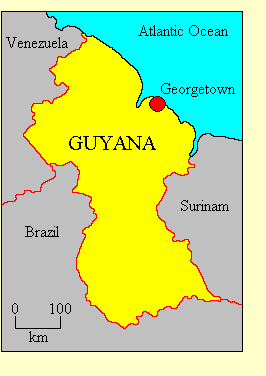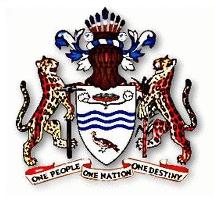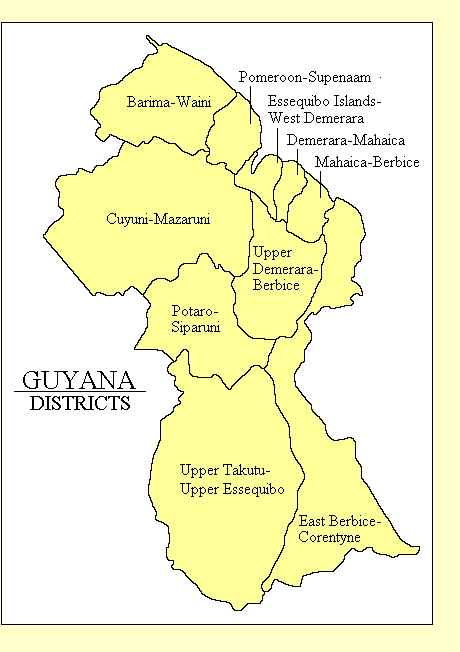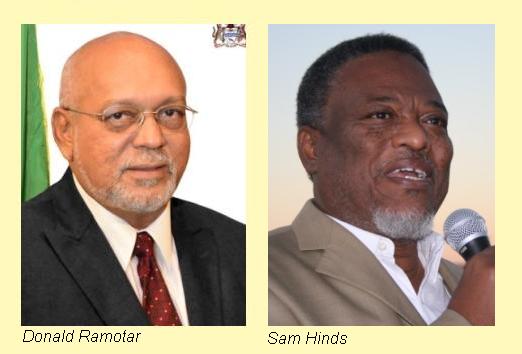

CO-OPERATIVE REPUBLIC OF GUYANA
• Official name: Co-operative Republic of Guyana
• Location: South America
• International organisations: African, Caribbean and Pacific Group of States, Commonwealth of Nations,
Non-Aligned Movement, Organisation of American States, United Nations, World Trade Organisation
• Borders: Brazil, Surinam, Venezuela
• Coastline: North Atlantic Ocean
• Land area: 214,970 Km2
• Population: 770,000
• Annual GDP (PPP) per capita: US$3,800 (2009 CIA estimate). World ranking: 129
• Ethnicity: East Indian 44%, Black African 30%, Amerindian 9%, other and mixed 17%
• Languages: English is the official language and is widely understood. Most of the population speak an English
creole. Hindi and Urdu are spoken in the Indian communities. African languages survive in some communities.
• Religion: Christian of various denominations 50%, Hindu 35% Sunni Moslem 10%.
• Form of government: Parliamentary democratic republic. Guyana is divided into ten regions.
• Capital: Georgetown

• Constitution: The
Constitution of Guyana came into effect on 6 October 1980. It was substantially amended in 1996.
• Head of state: The President, chosen by the legislature for a five-year term.
• Head of government: The Prime Minister, appointed by the President. The Prime Minister is the leader of the
largest party in the legislature and is accountable to it.
• Legislature: Guyana has a unicameral legislature, the Parliament of
Guyana, which has 68 members, of whom
65 are elected by proportional representation for five-year terms and three are appointed by the President.
• Electoral authority: The Guyana Elections Commission administers
elections.
• Freedom House 2009 rating: Political Rights 2, Civil Liberties 3
Political history
The coast of Guyana was settled by the Dutch in the 16th century, but the area was ceded to Britain in 1796, and in
1831 became the colony of British Guiana. African slaves were imported to work on plantations, but when slavery was
abolished the planters turned to imported Indian labour instead, producing a population divided between Christian
African and Hindu or Moslem Indians (now known as Afro-Guyanese and Indo-Guyanese). Agitation for constitutional
development began after World War II, and in May 1953
internal self-government was granted. The radical People's Progressive Party
(PPP) led by Forbes Burnham, an Afro-Guyanese, and Dr Cheddi Jagan, an Indo-Guyanese, came to office with Jagan as
Chief Minister. But British and American fears about the PPP's Marxist tendencies led to the suspension of the
constitution in October.

Fresh elections were held in 1961, when Jagan returned to office. The British then engineered a split in the PPP,
with a breakaway group led by Burnham forming the People's National Congress
(PNC). This split led to a permanant rift between Indo-Guyanese and Afro-Guyanese which has continued ever since. Burnham
came to power in 1964 and soon established a one-party state. Ironically the PNC moved far to the left of the
PPP, proclaiming itself a Marxist-Leninist party. In 1980 Burnham promulgated a new constitution under which he
became executive President until his death in 1985. His successor Desmond Hoyte continued in power until 1992.
Under international pressure Hoyte allowed a return to free elections in 1992, and the PPP, which had always
had majority support, returned to power with Jagan as President. In 1996 the constitution was changed to allow a
return to parliamentary government. Jagan died in 1997 and was succeeded as President first by
Sam Hinds and then by
Janet Jagan, Cheddi Jagan's widow. On her retirement in August 1999 Prime Minister Bharrat Jagdeo became President, and
Hinds (an Afro-Guyanese) became Prime Minister. At the 2011 elections the PPP lost its majority, but retained office
with the support of a minor party. The PPP's Donald Ramotar
was then elected President.
Freedom House's 2009
report on Guyana
says: "Guyana is an electoral democracy... Guyana was ranked 126 out of 180 countries surveyed in Transparency
International's 2008 Corruption Perceptions Index, the worst ranking in the English-speaking Caribbean...
Several independent newspapers operate freely [and] seventeen privately owned television stations freely criticise the
government... The government largely respects freedoms of assembly and association in practice...
The judicial system is independent, but due process is undermined by shortages of staff and funds."
Updated January 2012
|


